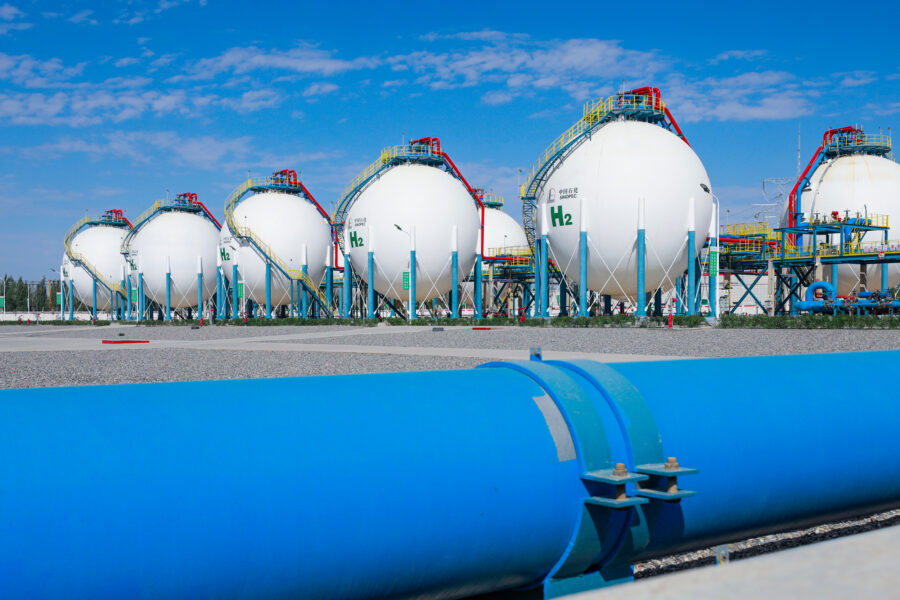Appalachian Hydrogen Hub Plan Struggles Amid Economic Worries, Study Says
Plans to build a hydrogen “hub” in western Pennsylvania, Ohio and West Virginia are under strain as a third of its projects have been scrapped and four development partners have left, according to a new report.
Driving those changes at the Appalachian Regional Clean Hydrogen Hub are uncertainties over whether the fuel would have enough end users, and how federal tax credits will apply to developers, said the Ohio River Valley Institute, a think tank that studies the economy of the Appalachian region and published the research brief. The group has previously criticized the hydrogen effort, ARCH2 for short, arguing that the project will have little environmental or economic value while using up to $925 million in federal funds.
“Hydrogen hub projects are unraveling due to high costs and uncertain demand,” Sean O’Leary, a senior analyst at the institute, wrote in the report. “The entire ARCH2 enterprise may amount to no more than a blip, albeit a very expensive one, on Appalachia’s economic and environmental landscape.”
ARCH2 is one of seven U.S. regional centers that would generate, distribute and consume hydrogen by bringing together companies that contribute to a project that is also designed to create jobs and reduce carbon emissions. A year ago, the Biden administration launched the effort with a pledge of up to $7 billion in seed money for the projects, saying they are a key part of its climate goals.
Some of the hubs plan to produce so-called green hydrogen, which generates the fuel using carbon-free energy sources such as wind, solar and nuclear power. But others, including ARCH2, aim to produce “blue hydrogen” generated by burning natural gas, a fossil fuel that is plentiful in the Appalachian Basin.
Critics dismiss blue hydrogen and say it prolongs the climate crisis by emitting more carbon from the gas.
ARCH2 executives did not respond to requests for comment. On Oct. 7, the hub issued a request for information from any new parties that want to participate. It said it prefers applicants who propose to provide multiple steps in hydrogen production, and is particularly interested in projects that would provide transport, delivery or storage, but will also consider proposals focusing on a single step of the process. It is accepting submissions until Nov. 8.
According to the Ohio River Valley Institute, five of the 15 originally proposed projects have been canceled: a hydrogen storage facility due to be built by MPLX, a Marathon Petroleum partnership to operate midstream energy infrastructure; First Mode, which would have retrofitted mining trucks with hydrogen fuel cells; a project by CNX Resources, a natural gas producer, to make blue ammonia using a process that stores carbon emissions; and two projects by TC Energy and Chemours to make hydrogen using electrolysis to separate the gas from oxygen in water.
The U.S. Department of Energy listed those projects as ARCH2 participants in an October 2023 presentation, but they were not included in another presentation by ARCH2 last month.
Chemours, one of the companies that is quitting ARCH2, said it withdrew from the hub mostly because the U.S. Department of the Treasury has not yet clarified the operation of a tax break for hydrogen producers that was included in the Biden administration’s Inflation Reduction Act, a landmark climate law.
“We remain committed to supporting the growth of the hydrogen economy and the broader clean energy transition despite the decision to step away from the projects under the Appalachian Regional Clean Hydrogen Hub (ARCH2),” Chemours said in a statement.
CNX Resources, another partial dropout, said it remains a development partner of ARCH2 but pulled out of the blue ammonia project at Adams Fork, West Virginia, in December 2023 because of uncertainty over the tax credit, according to a Reuters report. That project is no longer part of ARCH2.
Uncertainty over how the Clean Hydrogen Production Tax Credit will be applied has delayed the development of U.S. hydrogen infrastructure, and led leaders of the regional hubs to warn that any plan to require hydrogen makers to meet their energy needs with renewables would kill their projects, according to reports by Heatmap, a website covering news on climate change. The credit would be worth $3 per kilogram of hydrogen produced. The Treasury is expected to announce its plans for the credit by the end of 2024, Heatmap reported.
According to Energy Innovation Policy & Technology, an energy and climate policy research group, only two of 14 potential markets for hydrogen—oil refining and ammonia production—have an “excellent” chance of becoming a reality. Primary steel, long-haul aviation, long-haul marine shipping and petrochemicals have “good” potential, but six other categories, including day-to-day power generation and light-duty vehicles, have “poor” or “terrible” potential, the group wrote in August.
“Uncertain demand, under-capitalized and inexperienced project developers and uneconomic applications aren’t peculiar to the ARCH2 hydrogen hub,” O’Leary wrote in the Ohio River Valley Institute report, released Oct. 11. “Across the nation and around the world, these and other issues are causing clean-hydrogen projects to struggle in their pursuit of financing.”
The U.S. Department of Energy, which manages the hydrogen hub program, told Inside Climate News that it does not comment on outside reports, but has built flexibility into the program to allow for “updates” like those at ARCH2.
“DOE is working to make thoughtful investments in clean hydrogen to support and accelerate our vital transition to a clean energy economy,” a spokesman said in a statement. “The first phase of awards is focused on planning and DOE will use the same rigorous standards and criteria to evaluate any potential alternative projects as it did with initial applicants.”
Worries about whether there will be a profitable end use for hydrogen also contribute to the difficulty that hubs like ARCH2 are facing, said Rob Altenburg, senior director for energy and climate at PennFuture, a Pennsylvania nonprofit.
“There is potential but it is by no means a sure thing. So private capital is probably saying: ‘Is there going to be a market for it?’” he said. “The fact that we have questions about who is going to buy the hydrogen is probably making those private capital interests skittish on their investments.”
Altenburg said he’s skeptical about whether hydrogen will be as big a part of the energy transition as its backers claim. He argued that low-carbon projects such as energy-efficiency projects or using renewables to generate electricity have more potential to curb emissions in the near term.
“To the extent that a project like this diverts resources from the things that we can and should be doing now, that is a concern,” he said.
About This Story
Perhaps you noticed: This story, like all the news we publish, is free to read. That’s because Inside Climate News is a 501c3 nonprofit organization. We do not charge a subscription fee, lock our news behind a paywall, or clutter our website with ads. We make our news on climate and the environment freely available to you and anyone who wants it.
That’s not all. We also share our news for free with scores of other media organizations around the country. Many of them can’t afford to do environmental journalism of their own. We’ve built bureaus from coast to coast to report local stories, collaborate with local newsrooms and co-publish articles so that this vital work is shared as widely as possible.
Two of us launched ICN in 2007. Six years later we earned a Pulitzer Prize for National Reporting, and now we run the oldest and largest dedicated climate newsroom in the nation. We tell the story in all its complexity. We hold polluters accountable. We expose environmental injustice. We debunk misinformation. We scrutinize solutions and inspire action.
Donations from readers like you fund every aspect of what we do. If you don’t already, will you support our ongoing work, our reporting on the biggest crisis facing our planet, and help us reach even more readers in more places?
Please take a moment to make a tax-deductible donation. Every one of them makes a difference.
Thank you,
David Sassoon
Founder and Publisher
Vernon Loeb
Executive Editor
Share this article
- Republish
Disclaimer: The copyright of this article belongs to the original author. Reposting this article is solely for the purpose of information dissemination and does not constitute any investment advice. If there is any infringement, please contact us immediately. We will make corrections or deletions as necessary. Thank you.
Title:Appalachian Hydrogen Hub Plan Struggles Amid Economic Worries, Study Says
Url:https://www.investsfocus.com









